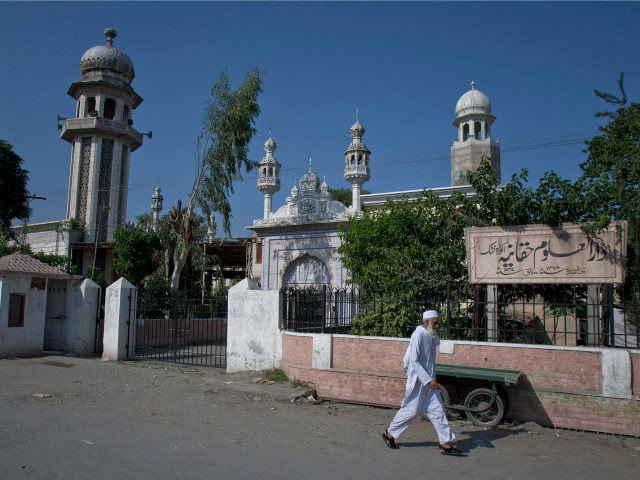The provincial government of Pakistan’s Khyber Pakhtunkhwa (KP), located along the country’s border with Afghanistan, reportedly provides millions of dollars to the “university of jihad,” led by the self-described “father of the Taliban.”
Michael Semple, an expert on Afghanistan and Pakistan at Queen’s University in Belfast, told Radio Free Europe/Radio Liberty (RFE/RL):
Faculty, students, and alumni of the seminary are intimately linked to several militant groups. The Afghan Taliban perhaps have the best-developed links, and they systematically recruit young graduates. This is not even a particularly secret activity. The recruitment works rather madrasas like the way blue-chip companies would approach a graduate recruitment fair.
Pakistani journalist and Taliban expert Rahimullah Yusufzai added:
Many students of this madrasa [religious school] have fought in Afghanistan and in Pakistan and joined the ranks of both the Afghan and Pakistani Taliban. Not all the students go and fight, but the more radical join these militant groups and become even top leaders of these groups.
Arguing that the school does not train jihadists, the journalist claims “the seminary also promotes a narrative that resonates among many in Pakistan – that Islam is under attack from the West,” notes RFE/RL.
Although Islamabad is reportedly cracking down on jihadists within the county, the KP province is lending significant support to the so-called university of jihad, RFE/RL points out, adding:
The Darul Uloom Haqqania religious seminary, located in Akora Khattak in northwest Pakistan, is known for preaching a fundamentalist brand of Islam and schooling a generation of fighters for both the Afghan Taliban and the Tehrik-e Taliban Pakistan (TTP), also known as the Pakistani Taliban.
Around 3,000 young men with beards and white skullcaps study at Haqqania’s sprawling campus — located about 50 kilometers east of Khyber Pakhtunkhwa’s capital, Peshawar, and 90 kilometers west of the national capital, Islamabad — making it one of the largest Islamic teaching centers in the world.
The Pakistani and Afghan wings of the Taliban consider themselves to be two distinct organizations with different groups and goals.
Notwithstanding the peace pact that Afghan President Ashraf Ghani has offered the Afghan Taliban, which would grant the jihadists political power, the so-called university, dubbed the Darul Uloom Haqqania religious seminary, continues to produce terrorists.
KP’s funding comes amid tensions between the United States and Pakistan over Islamabad’s refusal to stop lending support to terrorist groups who plan fatal attacks against American troops and their allies in neighboring Afghanistan.
The so-called university, considered one of the largest Islamic teaching centers in the world, teaches some of the most prominent jihadists to terrorize the region, Radio Free Europe/Radio Liberty reports.
According to the Pentagon, the Afghanistan-Pakistan region is home to the “highest concentration” of U.S.-designated terrorist groups across the globe.
U.S. President Donald Trump has suspended nearly $2 billion in security assistance to Pakistan for its refusal to take decisive action against terrorist groups, primarily the Afghan Taliban and their Haqqani Network allies.
Although Pakistan has vowed to target religious schools that produce and recruit violent jihadists, several radical seminaries, like Darul Uloom Haqqania, continue to operate freely and even receive Pakistani taxpayer funds.
The KP province alone provided the “university of jihad” $2.5 million to render the controversial institution more “mainstream,” notes Radio Free Europe.
Meanwhile, politician Imran Khan’s Pakistan Tehrik-e Insaf (PTI) also awarded $2.7 million in public funds to the facility last year, it adds.
In 2016, the KP provincial government reportedly gave the institution a $3 million grant.
Some Pakistani politicians condemned the move. Syed Alam Mehsud, president of nationalist party Wolesi Tehrik, reportedly acknowledged that it “proved” the provincial government was “supporting extremist elements.”
The Pentagon has long deemed KP province the epicenter of various jihadist organizations.
Pakistan has acknowledged that it has some level of influence over the Afghan Taliban, but it denies that it allows the group and its allies to plan and carry out attacks in Afghanistan.
RFE/RL points out:
The seminary’s teachings rooted in the Sunni Deobandi movement [followed by the Taliban], which developed in India in the late 19th century in opposition to British colonialism, encourages its adherents to conduct violent jihad, earning the seminary a sordid reputation.
The news outlets have identified the so-called university’s head as 80-year-old Sami ul Haq, also known as the “father of the Taliban.”

COMMENTS
Please let us know if you're having issues with commenting.